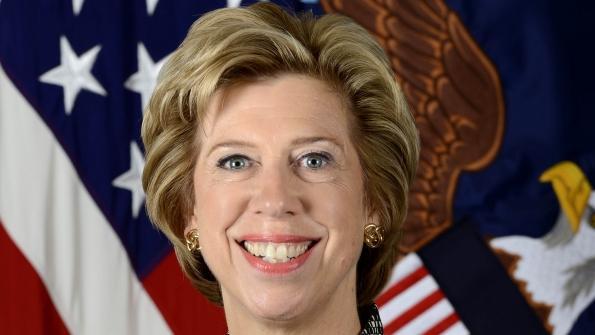
The Pentagon’s acquisition arm is tackling the military’s response to the novel coronavirus with a two-pronged approach: securing authorities for the defense industrial base to continue work while simultaneously supporting the Federal Emergency Management Agency (FEMA) and the U.S. Department of Health and Human Services (HHS), a DOD official said.
“If you recall, FEMA just got the lead role Friday,” Ellen Lord, under secretary of defense for acquisition and sustainment, told reporters March 25 at the Pentagon.
“I know COVID[-19] has been here for several weeks, but coordination at this level of detail just started Friday,” Lord added.
After determining the military had enough N95 masks to care for its members, the Pentagon is now supporting the interagency response by replenishing the supply for the rest of the government, she said.
A member of Lord’s staff met with an automotive company and a ventilator manufacturer to facilitate a business arrangement that can be used as a template for similar business arrangements, Lord said.
Lord also said she could not provide examples of how defense contractors are contributing to the nation’s war against the coronavirus but would do so within 48 hr. This is all happening in real time, she said.
“Our first action was to make sure that we have a system in place. If we do not have a system with clear roles and responsibilities, how information flows, how money flows, how we are going to really leverage our adaptive acquisition framework, we will descend into a very uncoordinated state,” Lord said.
Last week, President Donald Trump invoked aspects of the Defense Production Act (DPA). Two of those titles are within the purview of the Pentagon: DPA Title I and III, Jennifer Santos, deputy assistant secretary of defense for industrial policy, told reporters during the same briefing.
DPA Title I provides the authority to “priority rate defense contracts and to allocate materials in a way that best meets the warfighter needs,” Santos said.
DPA Title III provides the Defense Department (DOD) a way to partner with industry to strengthen commercial domestic industrial base capabilities essential to national defense. “Under these authorities the DOD may provide economic incentives to industry partners to aid in a timely delivery of essential domestic resources,” Santos said.
On March 22, Santos’ deputy, Scott Baum, began leading the DPA Task Force at FEMA. Baum will work with both industry and government partners to ensure DPA Title I and III are used where needed to combat COVID-19.
Baum is educating HHS on how to use the defense prioritization and allocation system, which was the first executive order Trump signed, Santos said. Additionally, Baum is determining how to leverage DPA Title III authorities to expand the industrial base to meet the demand signal the nation requires, Santos said.
Heatmap
Lord’s team has generated a supply chain heatmap that visually combines the number of COVID-19 positive tests with state and local shelter-in-place rules throughout the country.
“All of this information can help us with predictive solutions and planning when overlaid with the location of our industry partners,” Lord said. “This battle rhythm and cadence of meetings every day helps ensure we’re focused on the problems at hand and that we utilize data and analytics to chart the most effective and efficient path forward.”
Santos teamed with the Defense Contract Management Agency (DCMA) to establish a portal for all defense industrial base companies to provide information on their operating status.
Last week, Lord had four daily sync calls with defense industry association leaders to ensure the workforce can continue working by guaranteeing cash flow and issuing standardized guidance.
After Lord met with Senate Armed Services Committee Chairman Jim Inhofe (R-Okla.) on March 20, a memo was issued that deemed defense industrial base workers essential.
“This was very important because industrial leaders told us that state and local governments told us that state and local governments had different shelter-in-place rules,” Lord said.
Some defense industrial base workers were issued misdemeanor citations while trying to get to the office, Lord said. She also spoke with Pennsylvania Gov. Tom Wolf about keeping Boeing and BAE Systems facilities open in his state. She had a similar conversation with California state leadership.
Additionally, on March 20, Kim Herrington, defense pricing and contracting director, issued a deviation on progress payments, Lord said. This raises progress payment rates for large business from 80-90% and for small businesses from 90-95%.
U.S. Navy Vice Adm. David Lewis, DCMA director, has worked closely with the contracting workforce and the defense finance and accounting services to ensure invoices are continuing to be paid in a timely manner, Lord said.





